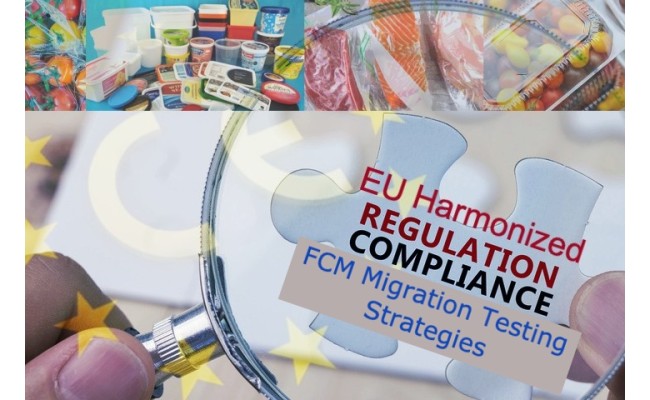- Call: +1 850 633 2663

The EU has some very stringent requirements when it comes to the usage and monitoring of food contact materials. Do you know, with a smart and effective migration testing strategy for food contact materials, you can not only speed up your product developments but also save your time & cost? According to EU regulations, any FCM, be it plastic, paper, glass, metal, cardboard etc. must be designed in such a way as to preserve the natural constituency of food. Food contact materials in the European Union (EU) are regulated by the Framework Regulation (EC) No 1935/2004 and the GMP Regulation (EC) No 2023/2006. The Framework Regulation is implemented for plastics by the Plastics Regulation (EU) No 10/2011 and its amendments. The Plastics Regulation is the most comprehensive example of food contact legislation in the EU. It uses a combination of a positive list of authorized substances and migration limits to protect consumer safety. However, it does not cover all the chemicals used in plastics since it omits:
- Most polymer product aids; most aids to polymerisation; most colorants and printing inks etc..
It also does not give much guidance on evaluation of non-intentionally added substances (NIAS). This training will explain how to use a combination of the Plastics Regulation, EU member state national legislation, risk assessment and the Principle of Mutual Recognition to show that all the chemicals used in a plastic food contact material or article are safe and market it legally in the EU. There will be particular emphasis on the migration testing you need to carry out, documentation you need to keep and documentation you need to send to your customers.
The Plastics Regulation is a complex piece of legislation with requirements to carry out migration testing, send information along the supply chain to customers and keep information that may be demanded by regulatory authorities. However, the complexity is significantly increased by the gaps in it’s coverage and how to fill them so that plastics can be marketed legally. Anyone involved in the food contact plastics supply chain who does not feel fully informed on how to show compliance for all the chemicals used in plastics would benefit from this training session.
Anyone responsible for showing that the food contact plastic materials or articles produced by their company are compliant with the requirements of EU law, in particular:
- Regulatory affairs professionals and formulators
- Quality managers and quality department employees
- R&D and Technical directors
- Other technical managers and executives; and
- Anyone who wish to understand the legal requirements that their company’s products must comply with
3 reviews